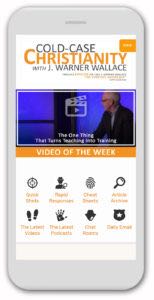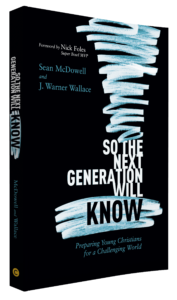
Response #1:
“Are you sure? Are you confident about that statement related to truth? It sounds like you have certainty. But if truth cannot be known with any certainty, then you can’t have certainty that truth can’t be known with certainty. Do you see the problem? As it turns out, all of us are certain about something, even if it’s just that you can’t be certain. But that claim, in and of itself, is self-refuting. It’s important that all of us determine which truth claims what we should trust or distrust. But to claim that nothing can be known or trusted is contradictory and impossible to live out effectively. Can you see why this sort of claim cannot be sustained?”
If truth cannot be known with any certainty, then you can’t have certainty that truth can’t be known with certainty. Do you see the problem? Share on X
OR
Response #2:
“What do you mean by certainty? Do you mean “beyond a possible doubt”? If that’s the standard, we would be paralyzed by fear and indecision. Will my car explode when I turn the key today? I can’t be sure beyond a possible doubt. Will my next restaurant meal result in food poisoning? Again, I can’t be certain beyond a possible doubt. We can’t (and don’t) live by that standard, because, if we did, we wouldn’t want to leave our homes. Instead we live by a lower standard known as “beyond a reasonable doubt.” This is also the standard we apply to the most serious criminal trials. If it’s good enough to use in those trials, it’s also good enough for us to use in our daily lives. Do you honestly think truth can’t be known beyond a reasonable doubt? Have you ever applied this standard to the case for God’s existence or the truth of Christianity?”
We can’t live by a 'beyond a possible doubt' standard, because, if we did, we wouldn’t want to leave our homes. Share on X


J. Warner Wallace is a Dateline featured Cold-Case Detective, Senior Fellow at the Colson Center for Christian Worldview, Adj. Professor of Christian Apologetics at Talbot School of Theology, Biola University, author of Cold-Case Christianity, God’s Crime Scene, and Forensic Faith, and creator of the Case Makers Academy for kids.
Subscribe to J. Warner’s Daily Email
J. Warner Wallace is a Dateline featured cold-case homicide detective, popular national speaker and best-selling author. He continues to consult on cold-case investigations while serving as a Senior Fellow at the Colson Center for Christian Worldview. He is also an Adj. Professor of Christian Apologetics at Talbot School of Theology, Biola University, and a faculty member at Summit Ministries. He holds a BA in Design (from CSULB), an MA in Architecture (from UCLA), and an MA in Theological Studies (from Gateway Seminary).


































